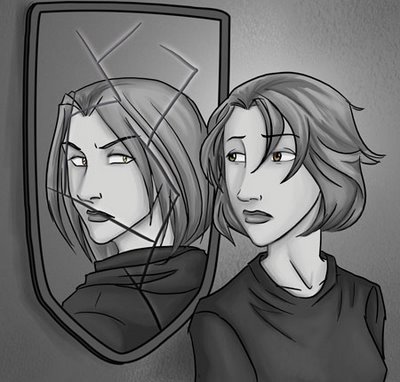Суеверие
Суеревие is the Russian word for superstition. This word declines as such:
| Sg | Pl | |
| Nom | суеверие | суеверия |
| Acc | суеверие | суеверия |
| Gen | суеверия | суеверий |
| Pre | суеверии | суевериях |
| Dat | суеверию | суевериям |
| Ins | суеверием | суевериями |
| У него нет суеверий. | He does not have superstitions. |
| Мне не нравятся суеверия. | I don’t like superstitions. |
| Как ты справляешься с абсурдными суевериями своей мамы? | How do you deal with your mother's ridiculous superstitions? |
| Я слушала лекцию о русских суевериях. | I attended a lecture on Russian superstitions. |
A superstition is the belief in the supernatural beings or events. Most all countries have them and they are rooted into their cultures. Some of the American ones are don’t break a mirror unless you want seven years of bad luck. If a black cats crosses your path you are also going to have bad luck. We have some rhymes to help people remember them as well, such as step on a crack will break your mother’s back. Some of Russia’s superstitions are: On exam day you shouldn’t wear anything new, make your bed or cut your fingernails, a funeral procession is good luck unless you cross its path. Both the US and Russia believe that breaking a mirror is bad luck. For Russians looking into a broken mirror is also is bad luck. Nowadays superstitions are not as highly regarded but certain ones are still believed by older generations. Growing up as Christian I was taught that superstitions are fun to think about but not something to live by because the supernatural of that sort is not real or worth worry about it.

Череп
The word for head in Russian is голова. But the word for the major bone structure that makes up head, or the skull, is the череп. This word declines this way:
| Sg | Pl | |
| Nom | череп | черепа |
| Acc | череп | черепа |
| Gen | черепа | черепов |
| Pre | черепе | черепах |
| Dat | черепу | черепам |
| Ins | черепом | черепами |
| У него маленький череп. | He has a small skull. |
| Она родилась без черепа. | She was born without a skull. |
| Она сломала себе череп. | She broke her skull. |
| Это моя любимая чашка из черепа прадедушки. | This is my favorite cup [made from] the skull of my great-grandfather. |
The skull, like all the other bones, is there to protect the organs behind it and in this case the brain. The skull is made up of minor bones connected by sutures and joints. The two major parts of the skull are the mandible (the jaw) which is part of the facial bones and the cranium. In English we have a lot of terms that incorporate the word skull. The word numbskull is an example which translates into Russian as тупица. We all know someone who has acted like a numbskull once in a while. Usually a numbskull is someone who did not quite think something through and did something or said something that was stupid or mean. I know when I have to work on a school project with a group there might be someone that isn’t quite competent and we have to talk to that person to help them pick up the slack.

Бездельник
бездельник is the word for slacker in Russian. It declines as such:
| Sg | Pl | |
| Nom | бездельник | бездельники |
| Acc | бездельника | бездельников |
| Gen | бездельника | бездельников |
| Pre | бездельнике | бездельниках |
| Dat | бездельнику | бездельникам |
| Ins | бездельником | бездельниками |
| Он бездельник. | He is a slacker. |
| Мне не нравятся бездельники. | I do not like slackers. |
| В группе у нас нет бездельников. | In the group we do not have slackers. |
| Я был бездельником, но уже нет. | I was a slacker, but no more. |
We all know a slacker or two and usually are not bothered by them unless we have to work on a project with them or are in a serious relationship with them. You can usually find them in school because jobs usually fire the slackers a lot faster than they are expelled from school. I am also sure we have all been a slacker about something at one point in our life. But for the most part we usually try to be on time about turning in an assignment and being efficient in the work as well. We are taught to do our best but sometimes things get in the way such as stress from a fight at home, a break up or just having a bad day that can cause us to delay in doing an assignment or doing it well. The etymology of the word is broken down as such без (without) + дело (work) + ник =suffix to make it into a pronoun. I remember having to work with one for a group project, and they were barely there, our group could not get a hold of him and he could not do the work. We were able to talk to the teacher and she talked with him and removed him from the group so we did not have to lose grade points on his behalf. For those that know that they tend to slack they need to try extra hard to not especially when working in a group because it makes it harder on everyone else. If they are not normally slacking but something came up they need to keep in touch with the group to let them know if they can help or not and if not ask to be removed from the group.

Глухой
In a perfect world everybody would be healthy and fully functional without disease ailments or mutations that cause deformities or impediments. But because we do not live in a such a world here are those that have disabilities such as blindness, deafness, the inability to speak and so forth. The word to describe a person who is deaf in Russian is Глухой. This word declines this way:
| singular | plural | ||||
|---|---|---|---|---|---|
| masculine | feminine | neuter | |||
| nominative | глухо́й | глуха́я | глухо́е | глухи́е | |
| genitive | глухо́го | глухо́й | глухо́го | глухи́х | |
| dative | глухо́му | глухо́й | глухо́му | глухи́м | |
| accusative | inanimate animate |
глухо́й глухо́го |
глуху́ю | глухо́е | глухи́е глухи́х |
| instrumental | глухи́м | глухо́й (глухо́ю) |
глухи́м | глухи́ми | |
| prepositional | о глухо́м | о глухо́й | о глухо́м | о глухи́х | |
| short form | глух | глуха́ | глу́хо | глу́хи | |
(The declension chart I found was on Wikipedia.)
| Она глухая девушка. | She is a deaf girl. |
| Мы играли с глухими детьми. | We played with the deaf children. |
| Я не понимаю, как глухие люди учатся говорить. | I don't understand how deaf people learn to talk. |
| Ты не видел клип на Ютубе, где танцуют глухие корейки? Просто офигеть! | Have you seen that YouTube video where the deaf Korean women are dancing? It's frickin’ amazing. |
By the way, here is a link to the video. It really is amazing.
There are many reasons for one to be deaf or become deaf. If the person is born deaf it is usually genetic. A fetus is usually able to hear by four months around the time of bone development. Some people become deaf later in life due to noise, illness, accident, or certain medications that damage a person’s ability to hear. There are three main types of hearing impairments, conductive hearing impairment and sensorineural hearing impairment and a combination of the two called mixed hearing loss according to Abdelaziz Elzouki, the author of Textbook of clinical pediatrics 2 ed. a source from the Wikipedia page. Parents tell their children to control the volume of their mp3’s and other sound producing products to try to prolong the onset of hearing loss as long as possible. There are also many forms of technologies created and being created to help restore or give hearing to those who have lost it or never had it. For those that are deaf, there is a deaf culture where deaf people can share commonalities in how they live with lack of hearing. There is a site www.deafnet.ru that expands on the deaf culture in Russia.

Чувство
Humans are both logical and emotional creatures. This is how this word declines:
| Sg | Pl | |
| Nom | чувство | чувства |
| Acc | чувство | чувства |
| Gen | чувства | чувств |
| Pre | чувстве | чувствах |
| Dat | чувству | чувствам |
| Ins | чувством | чувствами |
| У неё нет чувств. | She has no emotions. |
| Не скрывайте ваши чувства. | Do not hide your emotions. |
| Она покраснела. Она не привыкла к таким чувствам. | She blushed. She wasn't used to such emotions. |
| У него было всего лишь одно чувство. | He only felt one emotion. |
For some these attributes are exclusive of each other but others argue they intertwine. Logic is rationalizing something without a bias based on facts and evidence. Emotions or Чувство in Russian is how we feel about something which can be affected by our environment, events in our lives, or simply our personality. For some feelings are strongly felt and expressed, while others do not relate them as well, or relate to some better than others. Most people like to moderate their emotions because if someone becomes too emotional about something they find it hard to function which explains why some believe that logic and emotions are exclusive of each other; that one cannot be rationally thinking if they are emotionally unstable. On the other hand there are many examples of why emotions such as passion have driven people to do great things, such as the mothers who have lost their children to drunk go out and speak to schools about drunk driving to try to reduce its frequency. Emotions are powerful and can be positive if utilized and controlled correctly.
